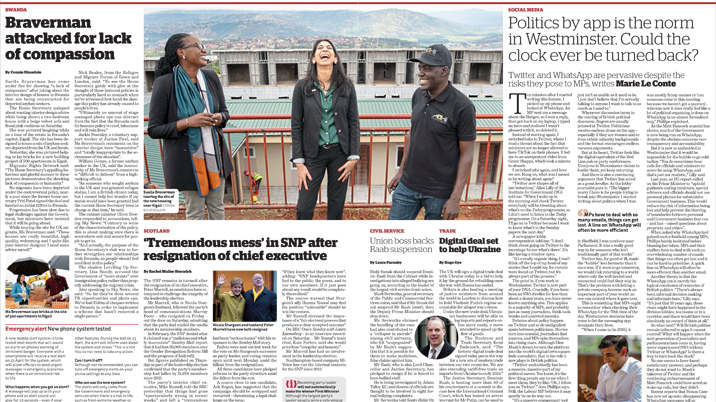
Has anything much happened while I’ve been away? Like Isabel Oakeshott scoring a hat-trick on revealing sources? Or Gary Lineker tweeting something? Or a new Brexit deal being welcomed or dismissed?
No, I thought not. All quiet. Good. Let’s not waste too much time raking over old coals. Apart from the question of free speech.
Free speech? That depends on who’s speaking.
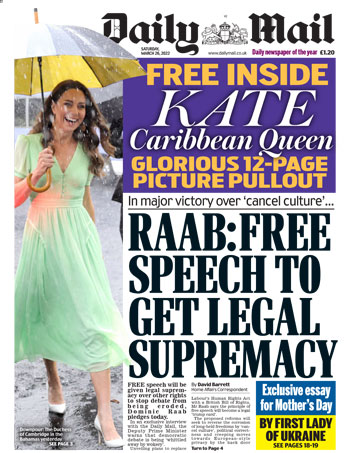
Almost exactly a year ago, the Daily Mail splashed on Dominic Raab promising to give free speech legal supremacy. This, it said, was a “major victory over cancel culture”. It was supposed to be part of the then deputy prime minister’s bill of rights, which sort of got waylaid. Last week, the Daily Express had Suella Braverman ordering “woke” police to protect free speech.
Well, being in the publishing industry, I guess we’d all say hurrah to protecting free speech. Except in both of these cases, the protection was specifically intended for those who feel their right to say what they like has been eroded by the wokerati.
For others, there is less concern. When Marcus Rashford piped up about free school meals during the pandemic, there were plenty who said he should stick to football – and some dreadful comments after he missed that penalty in the Euros final. Gary Neville, too, was accused of causing outrage when he expressed an opinion about strikes during the World Cup in Qatar. And then there was the other Gary. Lineker should, according to some, have been sacked (given the boot / shown the red card) from the BBC for his tweet about some ministers’ language with regard to asylum-seekers.
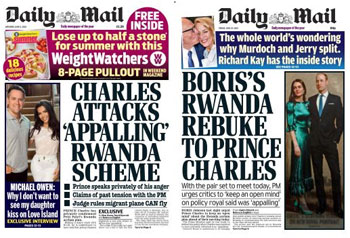
Royals are supposed to be above the fray, so the King, when Prince of Wales, was given flak for describing the Rwanda idea as appalling. As was Justin Welby for saying it was “ungodly”. Of course no one questioned his right to his opinion – I don’t think that anyone would say that it is beyond an Archbishop of Canterbury’s remit to speak on moral issues – but there was enthusiastic reporting of the “outcry” that followed.
If royals are not allowed to share their thoughts on matters political – and be ticked off if they err – how come it was all right for the late Queen to have her alleged support for Brexit splashed approvingly, almost as an endorsement of the Leave campaign? Of course, the Palace insisted she didn’t, the Sun had to carry a front page apology for so asserting – and then a few months later the Mail was telling its readers “Queen did support Brexit”. Neither said, “She should have kept her thoughts to herself, how could the woman who has been the soul of discretion for more than 60 years make such an error?” You can bet they would have done had she confided to someone that she thought the EU was a good thing.

And now we have the present Queen pitching in with her views on the “censorship” of Roald Dahl, much to the delight of the whitetops. What would the headlines have been had she spoken approvingly of the editing? I think we can guess.
The free speech anti-wokers are dancing on a pin, ostensibly adopting the “I disagree with what you say, but defend your right to say it” line, but in a new iteration: “Say what you like, but if I disagree with you, I will pillory you and try to pull you down.”
With Lineker, of course, the argument was that he was a man paid from the public purse. But, as with Camilla, had he expressed the reverse opinion, the reaction would have been quite different. Everyone, but everyone – including the papers so enthusiastically linking Lineker’s thoughts on refugees to his role at the BBC – knows that he tweets in a personal capacity. No one but no one thinks that he is speaking on behalf of the corporation and tainting its impartiality. Nor, in their heart of hearts, do they think that he has his huge following only because he presents Match of the Day. People are actually interested in what he has to say on all sorts of subjects.
Should Joan Salter apologise too?

Which brings us to Suella Braverman. A few weeks ago, she was confronted by Joan Salter, an 83-year-old Holocaust survivor, who railed at her use of the words “swarm” and “invasion” to describe people trying to get into Britain. This, she said, reminded her of the language used to justify the murder of her family and millions of others; adding: “Your hateful language has consequences”.
Braverman, herself the daughter of immigrants, replied that she shared a huge amount of concern and sympathy over the challenge of “illegal immigration”, but added: “I won’t apologise for the language I have used to demonstrate the scale of the problem.” She had to be honest to the British people and not shy away from difficult truths.
Since then, the Home Secretary has told MPs that there are 100 million displaced across the globe and “let’s be clear, they’re coming here”. In fact at least half of those displaced people are in their own countries, showing no inclination to move abroad. But then she had a column in the Mail to coincide with publication of her Illegal Immigration Bill, in which she repeated the 100 million figure, adding “and likely billions more, eager to come here if possible”. Is that what being honest with the British people is? Does anyone – and, most pertinently for a Notebook focused on the Press, the Mail that published her claim – believe that?
So, Braverman is challenged on her language and told it is reminiscent of that used in Nazi Germany. She defends herself, but no one appears outraged that Ms Salter should make such a suggestion.
Then up pops Gary Lineker tweeting that some language from “members of the government” was “similar” to that used in 1930s Germany. He doesn’t mention Braverman or the Nazis. The sky falls in. Braverman accuses him of “diminishing the unspeakable tragedy of the Holocaust”. There is a clamour for him to apologise.
Now let me get this straight. Two people liken Braverman’s rhetoric to that in pre-war Germany. If Lineker is supposed to say sorry, isn’t the logical extension that Ms Salter is also diminishing the Holocaust and should also be apologising to the Home Secretary? This way madness lies.
And then, two days after that “Suella blast”, the Express is splashing on her ordering the police to defend free speech. You really couldn’t make it up.
All for one and one for all! If only.
We’ve had quite a lot of “Suella” of late. For no sooner is the Lineker controversy swept from the front pages than she is back again flying off to Rwanda for a photo-opportunity.
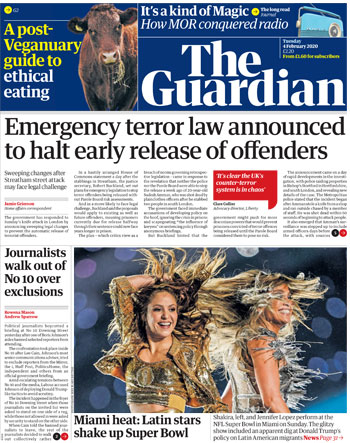
You may recall that in February 2020, the former Downing Street comms chief Lee Cain tried to sort political journalists into sheep and goats, making them stand on separate sides of a room before inviting half of them to a briefing by then Brexit chief Lord Frost on trade negotiations with the EU. The others, from the Mirror, Guardian and Independent were told they were not invited. Broadcast journalists including Robert Peston and Laura Kuennsberg stood up for their colleagues and said “all or none”. The result was a walkout by everyone. Would the print journalists have made such a stand without that lead? We may know now.
Last year, Priti Patel took a party of journalists to Rwanda to sign the first agreement on the removal of “illegal” asylum-seekers. The Guardian, Mirror, and Financial Times were not represented. This weekend, Braverman was joined on her trip by journalists from the Times, Sun, Telegraph, Express, Mail and GB News. Once again, there was no one from the Guardian, Mirror, i or Independent. Nor even the BBC or ITN.
Guidelines for government communications explicitly state that dealings with journalists should be objective and even-handed and “should not be – or liable to be – misrepresented as being party political”. Editors Alison Phillips at the Mirror and Kath Viner at the Guardian have both challenged the make-up of the party taken to Kigali. The Home Office press office response has been that it is not always possible to invite all media outlets on every trip. But to shut out the same organisations three times in three years (four times in four, if you include Pippa Crerar being turfed off the Conservative election bus) seems to stretch that argument. But maybe the lefties had been on other jaunts?
I asked the Cabinet Office press chief for details of briefings and facility trips since the 2019 election to which any of those who didn’t go to Kigali were invited when any of those who did were excluded. The response (very prompt) was “best you ask our FoI team”. I guess I’ll be waiting a while for them to get back to me. But I think we all know how many instances there will have been.
Suella says…

That, of course, is all a matter for the government’s communications departments, the newspapers (and GB News) that went can legitimately say it wasn’t their fault there was no one from the Mirror or Guardian.
But what of the coverage they produced? Travel journalism has for years been fraught with ethical dilemmas: if you accept a freebie, can we trust what you write about your trip? Restaurant critics and book reviewers have a less clearcut version of the same problem: the foodies pay their own bills, but when you’re as recognisable as Giles Coren, William Sitwell or Grace Dent, how can you not get preferential service? Similarly, the literary types will be called on to review works in their own field of expertise and are quite likely to know the author – there are more than a few examples of “you write a nice review of mine and I’ll be kind to you”.

And so it was with Braverman and her field trip. The Sunday Express, Mail on Sunday and Sunday Telegraph all obligingly splashed on her declaration that flights to Rwanda would start by the summer (I’m sure I saw that heading last spring, but am dashed if I can find it.) The Sun had a spread headlined “Summer take-off” with a big picture of Braverman and a clutch of graduate builders throwing blue baseball caps rather than mortarboards in the air. The Mail chose the same photograph for its inside coverage, and the Sunday Times put it on the front as a teaser to Matt Dathan’s report on page 2. [Matt Dathan is The Times’s home editor; this week Sunday editor Ben Taylor said he had been given a “crystal clear” assurance that there was no merger of the two titles coming down the track – but writers are already being tasked for both titles.] The Telegraph and Express preferred her “sharing a joke” with some people in front of a construction site. More on that picture in due course.
All of these stories were essentially “Suella says…” with a bit of President Kagame and a call-of-duty voice of dissent about the whole programme from a charity or political opponent. There was an update on the timetable envisaged, the legal process and a bit of chitchat about the wonderful interior design of the putative deportees’ prospective homes. Much as you’d expect, if not all that you might want.

Come Monday, it was the dailies’ turn to play “Suella says…” Here she scored three splashes – Mail, Express and Sun, all reinforced with more inside – a downpage page one appearance in the Telegraph, and an inside spread in The Times. This time, the line fed to the faithful was that Braverman was growing in confidence that the European Court of Human Rights would lift its objections to the programme. This was variously sold to readers as “Euro judges cave in”, “Euro judges set to back down” and “Is Euro court backing down?”
That question, from the Express, was the least dishonest of the trio, while the Telegraph had “Braverman: judges coming round on Rwanda”. The Times story was angled on the Home Secretary describing the Rwanda scheme as a “blessing”, but it still baldly stated in the first paragraph that the human rights court was “on the brink of backing down”. Exactly the same six words in exactly the same order that appeared in the first sentences of the Mail and Express splashes. The Telegraph had them on the brink of climbing down, while the Sun had them on the brink of finally letting Britain deport migrants to Rwanda. What a coincidence. Who says the friendly press pack was there just to take dictation?
Now, suppose I’m upset about my neighbour’s cats coming in to my garden and weeing on my lettuces (I’m not – I love her cats and they don’t), and we have a quiet chat. If I tell my husband she’s going to put up a fence to stop them, he’ll probably believe me. But that doesn’t mean it’s going to happen. Chances are that the subject would crop up next time he talked to her and she might confirm that she was going to do something or she might turn round and say, “I’ve no idea what you’re talking about.” In any area of life, it’s impossible to conclude the outcome of any argument without hearing what both sides have to say. And none of those newspapers represented on that Rwandan trip made any effort at all to contact Strasbourg to ask about the state of play in any negotiations. Suella – backed up by “government sources” – had said it, so it had to be true.
Only the Times of those five papers gave any space to any voice other than Braverman’s in covering that weekend – the Congo accusing us of turning a blind eye to Rwandan atrocities and far-right protesters targeting a village that might be asked to accommodate asylum-seekers. Everyone else just did as they were told – or as the government had hoped. As I have said a thousand times before, this is not journalism, it is propaganda.
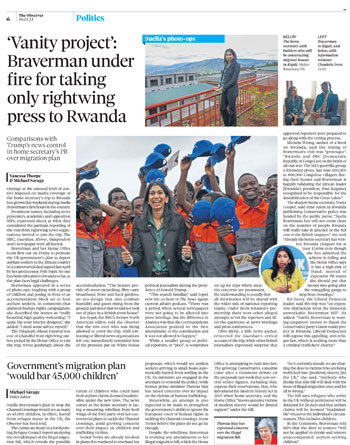
And what of those who weren’t invited? The FT, Guardian and Metro did not report the visit at all. The Observer gave the visit page 6, focused on it being a “vanity trip” from which left-leaning outlets had been excluded. It had Jon Sopel likening it to Trump news management, criticism from Yvette Cooper and Ed Davey and the author Michela Wrong, and a blast at the Telegraph’s “gushing” coverage, but no “Suella says”. That felt like a bit of an omission.
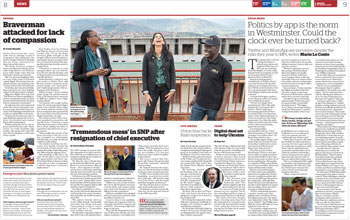
The i fell into the same trap. Having reported on Friday that she was going, its Monday coverage was all about interior design and her “lack of compassion”, nothing on what she actually said.
However much you disapprove of the circumstances in which her words are issued, and however much you may dislike the policy, it is wrong to deny readers the opportunity to hear what the Home Secretary says on a key policy issue. Put the other point of view, inject facts and figures, but don’t close your ears. That’s just as bad as picking up your pen at her command.
What a picture, what a photograph
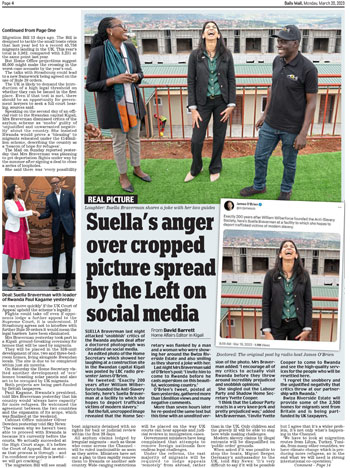
And then there was that picture. I felt uncomfortable with the baseball caps photograph and the Sun’s treatment of it, but the one that got most attention was the one where Braverman had her head back laughing as she stood in front of the building site.
The LBC presenter James O’Brien tweeted, “Exactly 200 years after William Wilberforce founded the Anti-Slavery Society, here's Suella Braverman at a facility to which she hopes to deport trafficked victims of modern slavery.” This prompted the Home Secretary to urge critics to visit Rwanda before “throwing around incredibly prejudiced and snobbish opinions”.
The Mail may hate social media, but it loves Twitter as a source of ammunition against dangerous lefties like O’Brien (and Lineker). In this case, the tweet produced a “Suella’s anger” story, in which the intro accused him of “doctoring” a photograph. An interesting choice of word in a world where homing in on the key part of an image is a part of the day job. At least the headline used the more apt term: “cropped”.
O’Brien had cut out some other people in the picture, apparently making it look as though Braverman was showing her joy at the building behind, rather than interacting with others. The story reported that he has later reposted his tweet with two other people back in it – the “Mail-approved” version of the photograph. It also said that his tweet had “gathered more than 1.6m views and many negative comments”. Well, that’s one way of putting it. By yesterday morning, the original had gone up to 3.2m views, while the second version, a pinned tweet at the top of his timeline, had 1.8m. Between them, the two posts had been retweeted 13,000 times, liked nearly 50,000 times and attracted some 4,000 comments. These did include “many” accusing him of misinformation – but the overwhelming majority backed him.
Meanwhile, O’Brien was having fun noticing that the Mail writer Dan Hodges had done exactly the same thing.
Wait. What? An actual Mail columnist did *exactly* the same thing… pic.twitter.com/GmtabtWzeh
— James O'Brien (@mrjamesob) March 20, 2023
Oh, and as to cropping. The photograph actually had three other people in it besides Braverman. But almost everyone cut out the man on the left to make the image tidier. Because that’s what you do, isn’t it?
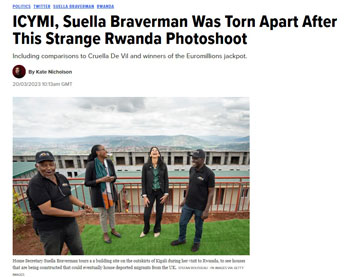
And another thing. The image of Braverman alone may have been a misrepresentation. But so, in a way, was the full picture. There’s no doubt that it and the baseball cap photograph were compelling shots, with animated subjects. Any picture editor would prefer either to the far stagier, stilted results from other moments in the visit, including some of her leaning against the same railing fence not sure whether to look at the view or the camera – rather in the tradition of disgruntled motorists pointing at potholes in local papers. But what those dull photographs showed was the extent and remoteness of the facility under construction. It was one of these, unsurprisingly, that was the Observer’s image of choice. Similar pictures appeared on the Sky, Huffington Post, LBC, Mirror, i and – to its credit – Mail websites. But nowhere else in print. Because this was all about “Suella”, not about the fate of the people in boats.

First name terms, for some
As you see, we are back to being on first-name terms with politicians. Or at least those we like. With the Home Secretary it’s sort of understandable. There’s only one Suella and that’s a far friendlier count for the subs than “Braverman”. Less so with the Prime Minister. “Sunak” is only slightly longer than “Rishi”. So here the bias shows. When he was “stabbing Boris in the back”, the Mail would go for the surname, but now we’re all pals, it’s usually Rishi. Lineker is never “Gary”, Starmer rarely “Keir”. This leads to those uncomfortable constructions, like that Express one about “Suella” blasting “Lineker”. Be consistent at least, please!
Sometimes it’s hard, though. And not only on what to call people, but in deciding where your loyalties lie. Like this. Thoughts and prayers.

The whole truth, and nothing but the truth…

No one, of course, is better at dividing loyalties than Boris. And, my word, has he come bouncing back to the front pages this week, starting on Sunday with the promise of his “bombshell dossier” that would clear him in the Partygate standards inquiry that reached its climax with yesterday’s committee appearance. Pity for him that all the loyal papers were being loyal to Suella, so that he had to play second fiddle on Sunday and Monday. Then there was the Casey report on the Met, Rupert getting engaged again, and, for the serious-minded, the shotgun marriage of Credit Suisse and UBS. So he had to wait until yesterday for the whitetops to come out fighting for him. As expected, there was much “kangaroo court” activity and today both run leaders – yet again - saying the inquiry is an expensive distraction from more pressing matters.
On the news pages, the papers again run true to form: the Express with the direct quote from Johnson “Hand on my heart, I did not lie” and the Mail sending Sarah Vine to proceedings to be rude about Harriet Harman for a colour splash in which she likened him both to a cat and a Sparrow (the pirate). Both predator and prey? Interesting. That “agile as a cat” element, complimenting Johnson on his smartness against his inquisitors’ bumbling, was even more interesting when set against almost every other assessment of Johnson as having been variously testy, fractious, bad-tempered.
And yet more interesting was the Andrew Neil column on page 11, saying that initially confident, Johnson had unravelled under not-very-forensic questioning, been forced on to the back foot and became less and less convincing on several fronts as the session went on.
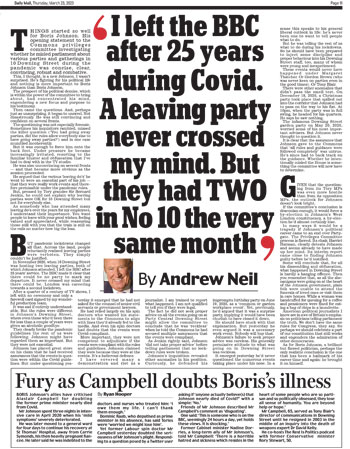
He goes on to say that in many ways it would be a tragedy if Johnson’s political career came to an end over Partygate – the process was flawed, Harman had clearly already made up her mind. Until you considered that “as all the shenanigans were going on at the heart of the Johnson government, plain folk were unable to attend the funerals of loved ones or visit them in care homes. While a woman was handcuffed for queuing for a coffee and pensioners were fined for eating a bag of chips in a laundrette.” We should, he says, celebrate our emphasis on politicians telling Parliament the truth and says the only realistic conclusion is that the “brilliant but flawed” brought it on himself.

While Johnson’s friends were distracted by Suella, his enemies were already on the case – the i has splashed on him every day this week and the Mirror and Metro three out of four days. The Guardian led on him “fighting for survival” yesterday, after the standards committee published his defence case, and being “on the brink” today, while the Star had him back as Pinocchio yesterday and today.
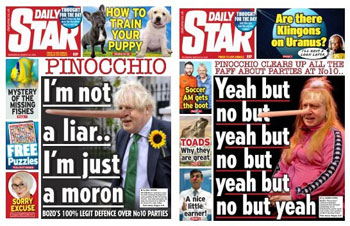
What has been interesting, though, has been the treatment he’s had from the Telegraph, Sun and Times. The Telegraph is conflicted, seeing the committee’s inquiry as unfair, but also regarding the breaking of lockdown rules as proof that the whole lockdown was wrong and damaging. So, yesterday, it was more interested in Starmer’s pensions “hypocrisy” (more of that later) than in Johnson’s case for the defence. The inside news coverage was generally sympathetic, but also included a commentary from Camilla Tominey asking how he could have failed to grasp the rules he set everyone else. (The conclusion is that he didn’t know what he was doing when he was laying down the law.)
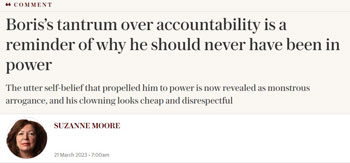
The previous day had brought a Vernon Bogdanor oped saying Johnson deserved a fair trial, not a kangaroo court, while the Telegraph website (though not the printed paper) had an excoriating piece by Suzanne Moore that includes the sentence “To see him kicking and screaming about being made accountable is a revolting spectacle. It serves to remind us of why he should never have been in power, not why he should be again.” Blimey! This is the Telegraph, the paper that paid him gazillions for his fictions about bendy bananas and his great thoughts about feckless blue-collar workers and Muslim women walking around like black letterboxes.
Today it has well and truly moved on with Tominey back with a front page commentary saying that the “cults” of Boris and Brexit are both imploding (Johnson having had a break from his grilling to join Liz Truss to rebel against Sunak’s Stormont Brake, which sailed through by 515 to 29), and a leader saying that the current prime minister’s authority has been strengthened.

The Sun, too, used to be great Boris tub-thumpers back in the day. Remember it told readers to pray for him when he had covid. And then there were all those boosterish splashes, first-person pieces. It loved him. Now it is less devoted. This week’s coverage has attacked a “show trial” that would “make Stalin blush” and put his case – yesterday it had “Proof I’m clear of party porkies” – but in each case as a single story on a lefthander. No spreads or big presentation. Yesterday’s splash on Ed Sheeran and drugs was obviously a belter, today it is William in Poland to lend support to the fight for Ukraine, with not a mention of the committee hearing on the front. When BoJo plays second fiddle to potholes, as he did on Tuesday, you could say the magic has gone.
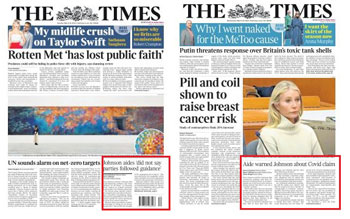
The Times has never been quite the fan that the Sun was – and that doesn’t seem to have changed much now that it has inherited former Sun editor Tony Gallagher. It gave Johnson’s attack on the “unlawful and biased” inquiry the page one hamper on Monday, but Tuesday and yesterday’s offerings were aides contradicting his evidence – including BYOB host Martin Reynolds saying he specifically told Johnson not to tell the Commons that Covid guidelines were followed “at all times” because it was “not a realistic position”. Today the splash is the unimaginative “Johnson fights for his future” – well, yes, we’ve known that for ages, tell us something new, something enlightening please – and there’s an equally uninspiring inside spread, but no leader. It’s almost as though the paper can’t be bothered any more.
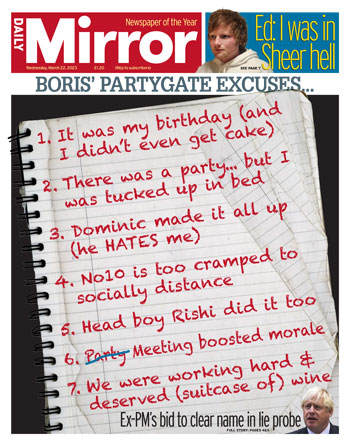
Regardless of which side of the Johnson fence they inhabit, it seems almost every paper finds him irresistible. I sort of understood the Mirror gunning for him on Tuesday and enjoyed its schoolboy checklist front yesterday, but the i had me baffled. The Casey report on the Met was a real landmark and for those papers to subjugate it to prelims of Johnson’s committee appearance was bizarre, to put it politely. The Mirror, which is obsessed with crime, waited until pages 10 and 11 to report Baroness Casey’s findings and there wasn’t even a marker on the front – the non-Johnson slots went to Murdoch’s latest engagement and Danny Dyer in a wig. For heaven’s sake. The i did at least have a puff on page one – but then made the story share a spread with Sunak beefing up his national security council and a crossword.
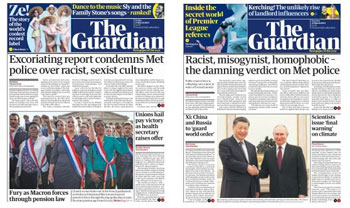
These were not the only papers that surprised me. The Guardian’s Vikram Dodd had the scoop last Friday: “Excoriating report condemns Met police over racist, sexist culture”. Well done them – I’m assuming it was a scoop and not a busted embargo, since the text said “the Guardian has been told”. So it had a full four days to work to develop the story ready for when the report was published on Tuesday. And what did it do? Splash on exactly the same angle (with added gay-bashing): “Racist, misogynist, homophobic – the damning verdict on Met police”. The inside material was decent enough, but so was that in most of its rivals. So instead of building on its advantage, it just left its readers with a sense of déjà vu. What a wasted opportunity.
Budget day – losing its shine
Jeremy Hunt’s first Budget was given quite a low-key reception across Fleet Street. In olden times, Budget Day always used to be the biggest and busiest news day of the year. The front would be cleared for a specially commissioned caricature or traditional photograph of the Chancellor holding his red case aloft, there’d be a big wrap splash, possibly a sketch, and a must-have “at a glance: what the budget means for you” panel. Then there’d be loads inside, loads in business plus a special supplement.
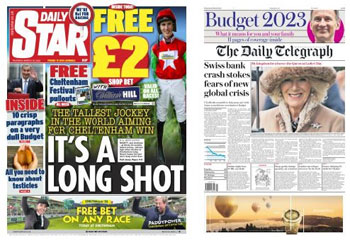
Not any more. Only The Times devoted its entire front to the package, the tabs all kept their Cheltenham puffs, and the Star splashed on the world’s tallest jockey. I suppose it’s inevitable that interest should wane when even the politicians themselves can’t contain themselves and maintain a sense of occasion. Time was that a chancellor would have to resign if the merest hint of what was to come should leak out before The Speech. Now there is pre-briefing, expectation management, and overt curtain-raising. There was Hunt doing the rounds days before the big event. As someone pertinently asked on Twitter, what was he doing on Laura Kuennsberg three days before the Budget rather than three days after when he could be questioned and challenged about what was in it rather than big himself up.
But that is where we are today. Yet the papers still have a capacity to shock and this time it was the realisation that the Star gave about the same proportion of its front to the Budget as the Daily Telegraph. Yes. The Telegraph restricted its coverage to the across-the-top puff and the bottom half of its splash, whose main line was Credit Suisse. Camilla at Cheltenham was the central image and the foot of the page had all the usual write-off nibs.
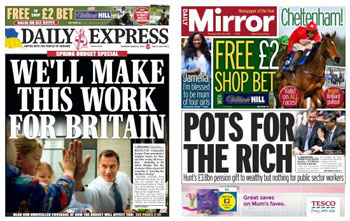
As ever, the approach to the package varied according to the political leanings of the title in question. The Express naturally went for the booster head “We can make this work for Britain”, the Mail had a question, the Guardian and Mirror both focused on “the 1%” or “the rich” who would be allowed to build bigger pension pots tax-free.
The rationale behind abolishing the £1m lifetime pot for tax-free savings was apparently to persuade older people to stay in work, particularly hospital consultants who were leaving because to carry on earning was actually costing them money. This was quite the story a couple of years ago. Both the Guardian and Mirror followed this up with research suggesting that only 100 doctors had left the NHS because of the pension pot limit. The Telegraph meanwhile went in the opposite direction after Rachel Reeves said that Labour would reverse the decision, splashing the next day on “Labour’s pension tax raid plan will ‘hit millions’”.
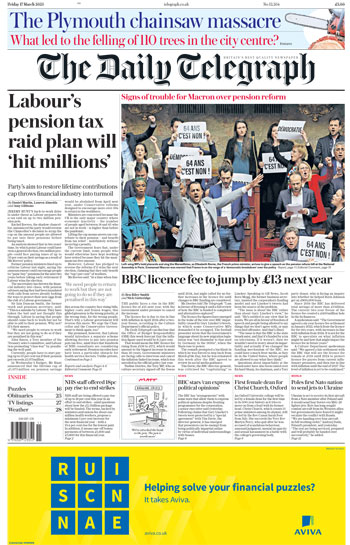
According to this story, about two million working people have passed or are approaching the lifetime cap and would be “liable to a major bill” if it were reimposed in two years’ time. How fair it is to describe the return of something that had been in place for nearly 20 years after a brief hiatus as a “tax raid” depends on your point of view. Similarly, the concern for the two million. There was no suggestion before the Budget that this was going to happen, there had been no lobbying (that I was aware of, at least) for the lifetime allowance to go. It was a windfall for the richest. Until Wednesday, they knew that if they carried on saving as they were, their pension contributions would come out of taxed income rather than be salted away tax-free, and that when they drew on the funds, they would be heavily taxed.
These are, I would venture to suggest, people who understand financial planning. They understand that stocks go up and down, they understand that fiscal regimes change. They will adapt. Indeed, the Telegraph story acknowledges this, saying that Labour’s threat to rescind the tax break is likely to damage the stay-in-work effort in that people might max out their pension funds and retire before the next election. Fair point. But to carp about maybe losing something next year that you didn’t have until yesterday doesn’t feel quite right.
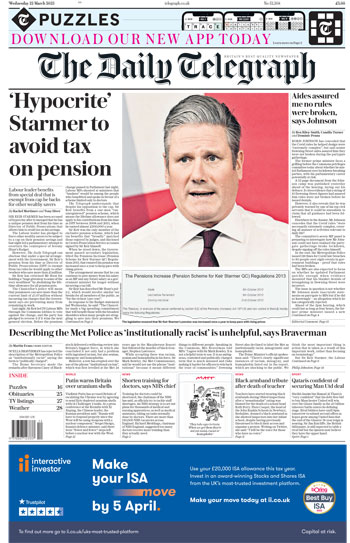
Clearly the Telegraph doesn’t agree, because it was still on the same hobby horse yesterday, when it splashed on “‘Hypocrite’ Starmer to avoid tax on pension”. This looked quite the story. It turns out that the Labour leader has a bespoke inflation-proofed pension pot from his days as DPP that is exempt from tax, so he personally would not suffer the effects of reinstating the lifetime allowance. The exclusive scheme was set up in 2008, bringing him roughly into line with the regime that applies to judges, and is similar to that created for previous DPPs, but not his successors. The perk was dropped when he left office in 2014.
Starmer is reported to have stopped paying into the scheme when he left the Crown Prosecution Service in 2013 and the pot is now thought to have grown up to just under £700,000. He is also able to build up a separate pension as an MP and the Times (which also cottoned on to the story, but in a more measured way and which today carries a leader accusing him of living in a glass house) estimates that this could be worth about £320,000. Together they would take him close to the existing cap, but because of his special circumstances, the DPP money doesn’t count towards the lifetime limit.
Still, he’s not there yet and so is not, at the moment, in a position to benefit either from the scrapping of the limit or to suffer from its reinstatement. But he might be.
It’s a legitimate story. A good story. But does his party’s stance make him a hypocrite? And who says he is anyway? Ah. In the penultimate par of the Telegraph splash, Sir Iain Duncan Smith says, “It’s as close to hypocrisy as it is possible to get”, so not quite the same thing, but I guess it will have to do. But why bother with a rentaquote? The story is strong enough to stand on its own legs without it.
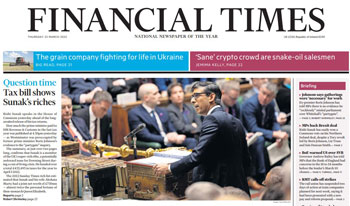
While we’re talking about tax, how about the prime minister and his declaration yesterday? Hats off to the FT and the Guardian for noting on their front pages that Sunak had released his tax return while everyone was otherwise occupied. Both the Times and the Telegraph made the same point on their Brexit vote spreads.
There doesn’t seem to be anything untoward about Sunak’s tax affairs – we all knew he was fabulously wealthy, but there's quite a lot we don't know about his "blind management arrangement" – but you have to squint a bit at his news management yesterday: the Brexit vote, the tax disclosure, William’s surprise trip to Poland – which must have been approved or at least run past Downing Street. And all while the blond one was desperately trying to lay the foundations for a comeback. It was almost Blair-like in its scale and breadth (whether that is something to admire or not, I couldn’t possibly say) and the message was unmistakeably “Johnson’s a sideshow; I’m in charge now.”
Since I’ve been gone…
Catch-up time: a few random thoughts from the papers since last we met.
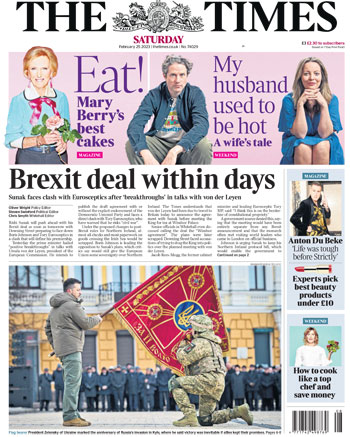
First of all, bring back subs who know their job. The Times seemed to be ahead of the pack on the negotiations on the Northern Ireland Protocol, but then just as Sunak and Von der Leyen were approaching the finishing post, it tripped up and said that the European Commission president would be invited for tea at Windsor Palace. Three senior writers, the newsdesk, the backbench, the subs and the revise – and not one of them knows the difference between a palace and a castle? Oh dear.
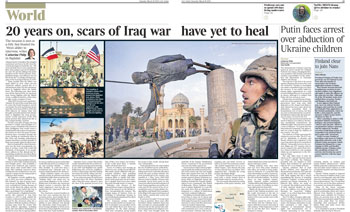
Then, this Saturday, not so serious but a bugbear of mine: the headline on an anniversary piece by Catherine Philp says, “Scars of Iraq war have yet to heal”. Scars don’t heal. Wounds heal. Scars are what are left when the wound heals. They may fade. But they are scars. They cannot heal. Got it?

Hopping back to Lineker for a moment, how flat-footed did the Guardian look the other week when it splashed on his suspension by the BBC when everyone else was going on the mutiny? Ian Wright tweeted just before 6pm on the Friday that he would not be appearing on Match of the Day, others were swift to follow. Did the Guardian not understand that this was the better story or was it plagued by early Friday deadlines and the absence of a second edition? Not its finest hour.

Too soon? It came as a jolt to see this splash in the Express. I know I’m old and slow to adapt, but I can’t be the only one who still thinks of the lady who took tea with Paddington when people talk about “the Queen”. And I’m sure that Express readers are with me on this. It may be correct, but it’s still confusing to give the King’s wife the unvarnished title. Yes, Queen Consort was a mouthful, Camilla is perhaps too familiar (though if you’ve been calling her that for thirty years, it seems a bit late to get all stodgy now), so I don’t know the answer. But I know this doesn’t feel right. Yet.
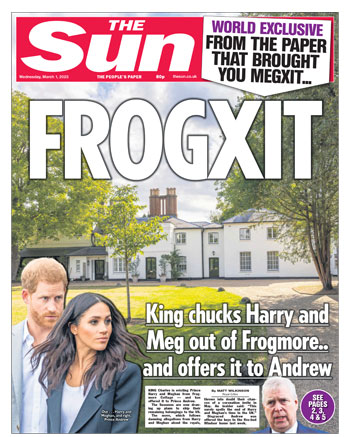
Finally, I know it may seem that I’m obsessed with the royals, but that’s only because the papers are even more so. Since the last Notebook, they have provided 50 front-page pictures for our nationals. It might be argued that the latest instalments in the Harry and Meghan saga, including the christening of Princess Lilibet, had some “news” justification. I liked the Sun’s Frogxit front page, which divided the crowd in one journalists’ social media group and the “King and Queen” line afforded by the knighting of Brian May was fun – that even made the Guardian front.

But there was still an awful lot of Kate just being Kate; riding a bike, wearing military camouflage, drinking Guinness. I find her easy on the eye and am envious of her figure, her agility, her suppleness. But you can have too much of a good thing. That Dominic Raab freedom of speech front in the early part of this Notebook was published on the Saturday before Mother’s Day and there she was. This year she was back again, with the children, on the day after Mother’s Day. Because she's a mother (there are others). And not only in the Mail, Telegraph and Express, but also in the Times. So what? Except that she’d been their poster girl in the previous issue on the Saturday, and in her combats the week before. Enough already.
Front page of the fortnight
Nothing stunning about this, other than the fact that it was launch day for a new vertical titlepiece for the Metro. I like it. And it’s improving as it beds in.
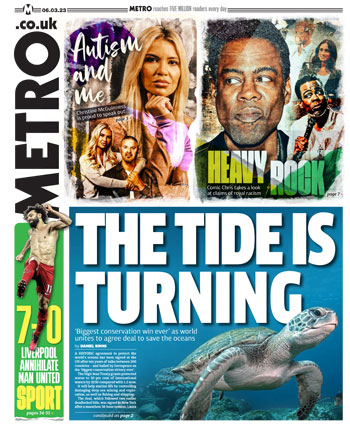
Liz Gerard’s Notebook is a fortnightly column published in the InPubWeekly newsletter. To be added to the mailing list, enter your email address here.












